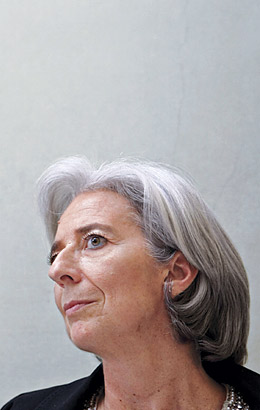
Rarely do the names Descartes and Voltaire emerge during a debate on global economic policy. But when they do, it often means Christine Lagarde is using philosophy to drive home a sophisticated point about the markets.
As the first female Finance Minister of any G-8 nation, Lagarde knows well what it takes to break down barriers. In France she has tirelessly pursued intelligent reforms of the economy with a no-nonsense approach. And with her counterparts in the G-20, she has forcefully advocated for greater adherence to international standards, ensuring a race to the top rather than the bottom.
Historic moments, like the financial crisis we are living through today, require extraordinary figures to take extraordinary action. For Lagarde, 53, that mandate builds upon a lifetime spent championing shared economic prosperity through a robust transatlantic relationship. Whether in Chicago, where she led Baker & McKenzie, one of the world's largest law firms, or in Paris, where she has worked to confront a deteriorating market, Lagarde excels. It is no coincidence that despite being one of the first countries to face this crisis, France is showing considerable resilience.
As president of the New York Fed and as Treasury Secretary, I've met Lagarde a number of times. In each encounter, her lightning-quick wit, genuine warmth and ability to bridge divides while remaining fiercely loyal to French interests have been a source of admiration. In capitals around the world, as governments collectively seek economic recovery, undoubtedly there is shared appreciation that in Paris sits Christine Lagarde.
Geithner is U.S. Secretary of the Treasury